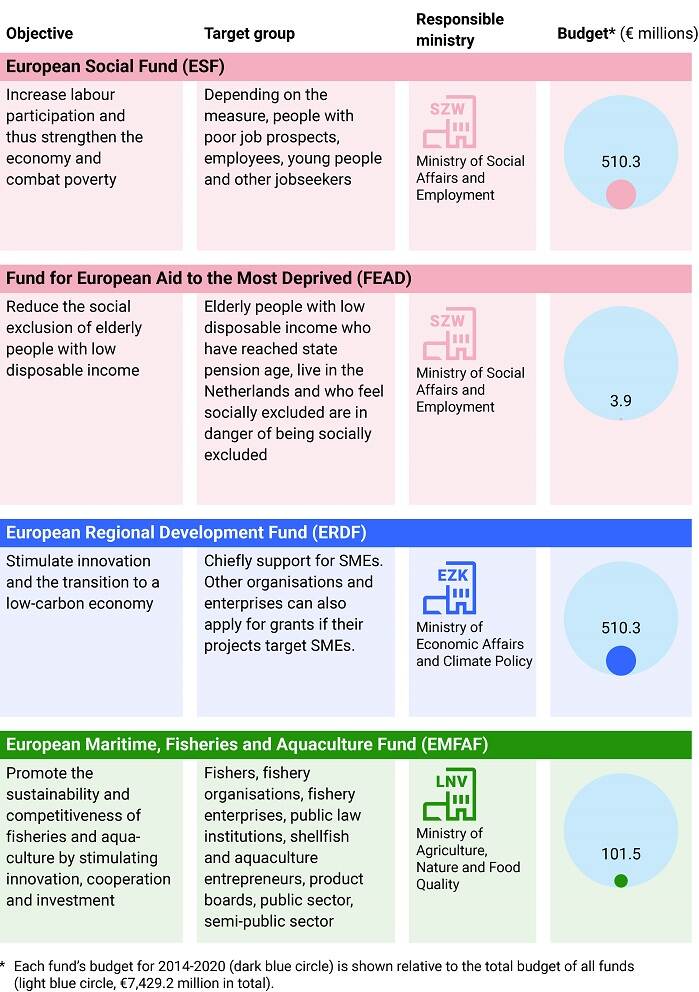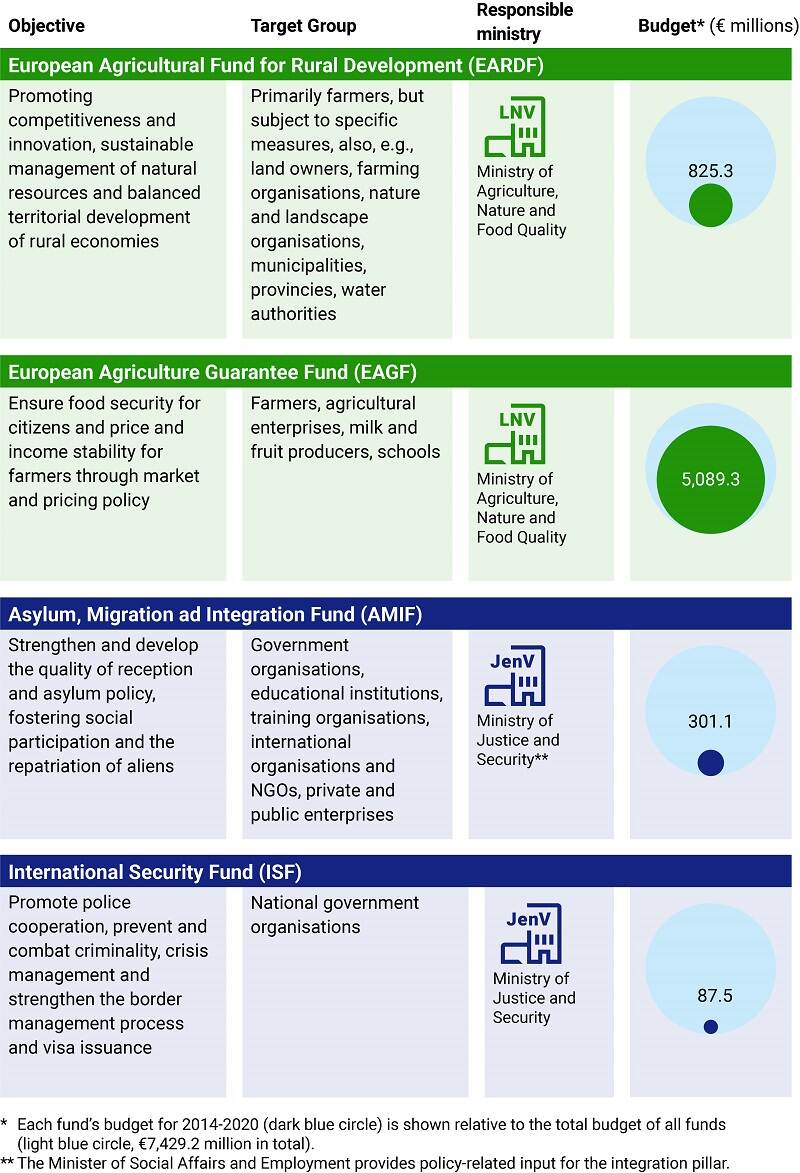Added Value of EU Grants in the Netherlands
The Netherlands spent more than €7.4 billion in EU grants in 2014-2020. The European Commission and 4 Dutch ministers are together responsible for the use of this money. But neither Brussels nor The Hague knows whether the money is spent optimally to overcome the most urgent national problems. Improvements are possible, concludes the Netherlands Court of Audit in its report, The Added Value of EU Grants in the Netherlands.
The audit found that Dutch recipients are satisfied with EU grants. A large majority of the nearly 1,300 grant-funded enterprises and organisations that completed a survey held by the Netherlands Court of Audit had no doubt that an EU grant had made a difference for their projects. However, there is no substantive understanding at national level of how the budgets provided from EU funds should be allocated across measures and/or regions. With the exception of €0.5 billion in grants from the European Social Fund (ESF), management of how the money should be spent to generate the most added value is also inadequate.
Why did we audit EU grants?
Little is known about the efficiency and effectiveness of EU grants that are managed jointly by the European Commission and the Netherlands. We have audited the regularity of EU funds flows in the Netherlands in the past. But what outcomes do they have for the Netherlands? The ministers concerned publish few reports on their efficiency and effectiveness. This audit looked at whether EU grants were a decisive factor to achieve the recipients’ goals. What difference do investment grants make for dairy farmers? Would projects to integrate refugees have been carried out without a grant? How important is EU funding to a startup company?
EU funds have different objectives, target groups, responsible ministers and budgets


Do grants maximise added value?
Ministers (and in some cases provinces and municipalities) allocate the budgets released from EU funds to national programmes. The programmes cover a wide range of areas, from agriculture, fisheries, rural development and nature management to regional economies, labour market participation, the prevention of social exclusion, the reception of asylum seekers, the repatriation of aliens and cooperation among police services.
Problem analyses and substantive reasons for the allocation are often absent. It is therefore not known whether EU money generates the maximum added value. The criteria applied to allocate grants are sometimes simply copied from one programming period to the next.
More insight into outputs and outcomes would increase the added value of EU grants in successive programming periods. At present, the focus is mainly on checking that the available money is actually spent. There is less concern for the timely evaluation of grant-funded outcomes.
Obstacles in the grant process
Interviews and surveys held among both grant recipients and rejected applicants found that EU grants made a positive contribution to grant-funded projects. 9 out of 10 respondents said their projects were started earlier, on a wider scale or were of higher quality thanks to EU grant funding. Half of the unsuccessful grant applicants did not go ahead with their projects and a third changed the project content.|
More than two-thirds of the respondents said they had had to engage an external adviser to deal with the time-consuming grant application process and/or to report on and account for their use of EU money. The administrative burden was said to be onerous.
Recommendations
We recommend that ministers improve the substantive reasons for their allocation of grants. Better indicators are also necessary to provide insight into the results achieved by the grants. Furthermore, the goals pursued by EU funds should be recognisable in the results achieved.
What audit methods did we use?
We investigated how the responsible ministers prepared, implemented and evaluated the allocation of EU grants to project initiators. We analysed relevant documents and put direct questions to the ministers concerned. Based on the information provided by the ministers and our document analysis, we gathered information on the goals, outcomes and budget utilisation of the various EU funds and the values on the indicators.|
An important pillar underpinning our audit was a survey we held among EU grant applicants. It provided an insight into the added value of EU grants at project level.
Current status
Four ministers responded to our findings and recommendations (Agriculture, Nature and Food Quality; Economic Affairs and Climate Policy; Justice and Security; and Poverty Policy, Participation and Pensions). The audit report was submitted to parliament and published on 18 October 2022.
The bigger picture
- This audit report is the latest of our EU-related publications.
- On 20 May we published our Report on the National Declaration 2020 and on 15 May 2019 we published the Report on the National Declaration 2019 on the same EU-related subject. The audit is also closely related to the series of EU Trend Reports we published, the latest being the EU Trend Report 2016.
- More information on the European Union is available on our EU website.
- All our EU-related publications can be accessed through the button below.
Attachments
-
Methodology appendix to the report The Added Value of EU Grants in the Netherlands
-
Preconceptions about the use of EU money
Our first associations with the EU are rarely positive. Airports where planes will never land. Motorways from nowhere to nothing. ...
-
EU grants make a difference, but do not necessarily meet the greatest challenges
More than €7 billion spent in 7 years: recipients satisfied The Netherlands spent more than €7.4 billion in EU grants in ...